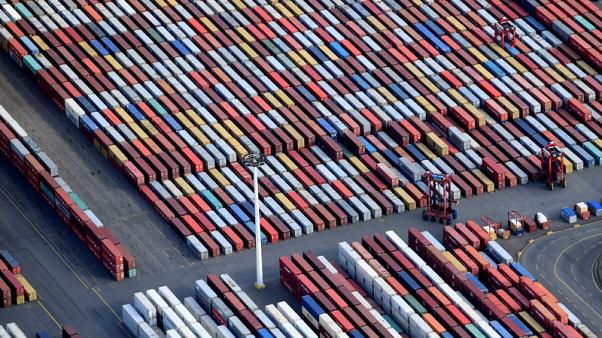BENGALURU (Reuters) - Euro zone economic growth will be modest at best over the coming year, according to a Reuters poll of economists who unanimously said the trade war between the United States and China threatens the outlook.
After marking its fastest pace in a decade last year, economic growth in the currency bloc lost some momentum at the beginning of 2018. It is forecast to remain steady at 0.4 percent every quarter through to end-2019, according to the Sept. 3-6 poll of more than 80 economists.
But even that expected modest pace was likely to be disrupted if a trade war between the United States and China escalates further, hurting business and consumer sentiment and keeping financial markets on edge.
“Although we have penciled in ongoing skirmishes on this front, a full-blown trade war initiated by the U.S. but with matched retaliation by the EU, China and other affected trade partners remains a key downside risk to our forecasts,” said Elwin de Groot, head of macro strategy at Rabobank.
All 44 economists in the poll said the current trade conflict was a downside risk to growth forecasts.
China’s commerce ministry said on Thursday it will be forced to retaliate if the United States implements any new measures after President Donald Trump threatened new tariffs on another $200 billion of Chinese imports.
US and European Union trade chiefs meet in Brussels next week to try and mend transatlantic ties after Trump agreed to drop his threat of tariffs on EU cars.
While the consensus for full-year GDP growth was 2.1 percent this year and 1.8 percent next, unchanged from last month, on a quarterly basis the median for growth was 0.4 percent every quarter until 2020, down from a 0.4-0.5 percent range in August.
Economists were almost evenly split between being concerned and not worried about differing speeds of growth and inflation in member countries within the currency bloc.
While 20 of 41 respondents said they were concerned, the remaining 21 said they were not, including two who said they were not concerned at all.
Euro zone inflation surpassed the European Central Bank’s 2 percent target ceiling last quarter, primarily boosted by higher energy prices but was forecast to average 1.7 percent for the next two years, unchanged from August’s poll.
The ECB’s plan to shut its asset purchases programme by end-December after spending more than 2.6 trillion euros ($3.0 trillion) worth of mainly government bonds to push growth and inflation up could be delayed if global threats intensify.
“Given that President Trump is still making some threats about tariffs ... I think (ECB President Mario Draghi) can’t be fully at ease over the risks surrounding trade so he’s bound to raise that again as a threat,” said Jennifer McKeown, chief European economist at Capital Economics.
Still, the latest poll showed the ECB will keep its refinancing rate at zero percent and deposit rate at -0.40 percent when policymakers meet on Sept. 13.
Thirty of 52 economists polled expect the central bank to have raised its refinancing rate by the end of next year, with the median of those 30 at 0.25 percent. The median of all 52 economists was 0.10 percent, a response given by only five contributors.
The ECB is forecast to hike its deposit rate by 15 basis points to negative 0.25 percent in the third quarter of next year and take it to 0.25 percent by end-2020.








